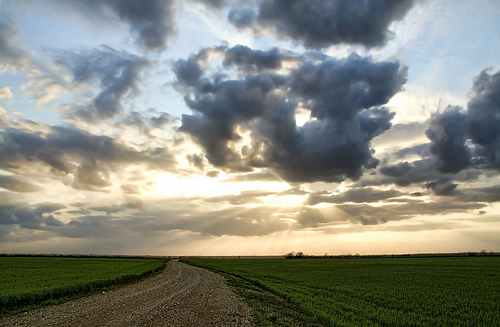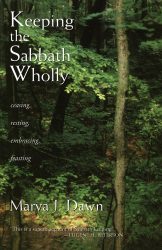

Thank-you to Amy Davis Abdallah for joining the Emerging Scholars Network’s blogging team by sharing a pair of 2018 Lenten devotionals, looking forward to next week’s Palm Sunday’s Short-Lived Praise. Follow this link to explore ESN’s Lenten devotionals. To God be the glory! ~ Tom Grosh IV, Assoc. Dir., ESN
Quotation
If we are not able to rest one day a week, we are taking ourselves far too seriously. – Marva Dawn, Keeping the Sabbath Wholly
Reflection
We say Lent is 40 days of fasting.
But there are actually 46 days between Ash Wednesday and Easter.
We still say it’s 40 days of fasting.
Why?
Well, there are 6 Sundays. And Sundays are never a day of fasting; Sunday is always about celebration because Christ rose on Sunday.
So Lent is 40 days of fasting if we break our fast each Sunday. The Christian Sabbath is for celebrating, resting, and trusting God.
We often forget that, don’t we?
I was first encouraged to celebrate Sabbath at the inception of my Masters’ program. The professor waxed eloquent about how our work will never be finished, but we celebrate Sabbath because God finishes the work. My soul said “yes!”
And then I considered my life: full-time school, 3 part-time jobs. . . . sure, I needed Sabbath, but resting a whole day a week was impossible! My practical self gave an abounding, “no!” and that settled it.
Two years later, I was interning at a church and noticed that two colleagues exhibited great joy and peace. They also celebrated a weekly Sabbath. I decided to finally submit to God.

Since Sunday was a work day, Thursdays became my Sabbath, the day I ceased working, worrying, controlling, and more (Marva Dawn’s Keeping the Sabbath Wholly was helpful to me). I’d stay late at work on Wednesdays to get everything done, and when I thought about work during Sabbath, I’d write down my thoughts and then lay them aside.
Some Thursdays were wonderful with delightful weather, activities, and worship. And some weren’t. But I kept it up.
I thought the major test for God’s call to Sabbath would come when I returned to school and the three jobs. I prayed, God, if you really want me to celebrate Sabbath, you’ll have to make this work.
I was amazed. Everything got done, and I did no work on Sundays. In fact, resting gave me a renewed mind and I enjoyed my work more.
We academics are under the false delusion that doing work every day ensures graduation, tenure, and publishing. Truth is, though, it’s God who prospers our work, and our primary job is to trust God.
But do we trust God?
The key to Sabbath is to trust God rather than ourselves. This is clear when Leviticus 25 calls the people to Sabbath the ground every seventh year. To plant nothing and eat only what grows from the ground requires trust in God to provide.
To work hard for only six days and to rest for one also requires trust in God to provide.
It’s the fourth commandment. I suppose if God wants us to do it, God will make it work. All I have to do is trust and stop working.
Three years after I began Sabbathing, I found myself teaching full-time at the college and in a full-time PhD program that had no summer courses. I only worked one Sunday in those five years. All other Sundays, I rested. And all the work got done.
You can do it. If you choose to trust God.
Questions
- Some state that we need not Sabbath because Jesus did not reiterate the command in the New Testament. But WWJD (What Would Jesus Do)? He Sabbathed properly and helped those around him learn. Do you think this command is binding? Why or why not?
- What would have to happen in your life for you to demonstrate your trust in God by celebrating Sabbath?
- At times, we’ve been very legalistic about Sabbath, but Jesus appears less so. The command to Sabbath in Deuteronomy 5 states that we do it because we are no longer slaves, but free people. Sabbath offers freedom in resting. So what does resting look like for you?
Prayer
God, I want to trust you, but I often fail. Remind me of your faithfulness and teach me to find rest in it. Transform me into your image as I seek to rest and trust. I ask this in the name of the Son, through the power of the Holy Spirit, and to the glory of God the Father.
Dr. Amy Davis Abdallah is Associate Professor of Theology and Bible at Nyack College and Adjunct Professor of Worship at Alliance Theological Seminary. She preaches and teaches for churches, conferences, and other ministries in the United States and internationally. She also encourages Christian women to expand the Kingdom of God through the educational program Empower as well as a rite of passage for Nyack College Seniors. She is the author of The Book of Womanhood (Cascade, 2015), and her writing has been featured by Christianity Today, CBE International, Redbud Writers Guild, and Missio Alliance. Amy loves to exercise, take photos, climb mountains, adventure with her husband and son, learn languages, and enjoy the beach. Find her on the web at amyfdavisabdallah.com and on twitter @amyfdavisa

Such a wonderful book! It was very helpful in starting a habit of taking a sabbath.
Your questions, my replies…
1.Some state that we need not Sabbath because Jesus did not reiterate the command in the New Testament. But WWJD (What Would Jesus Do)? He Sabbathed properly and helped those around him learn. Do you think this command is binding? Why or why not?
I think this goes a lot deeper than whether or not Jesus reiterated the command….The sabbath, as one of the very non-moral commands in the 10 commandments, is a ceremonial command. And so I think that it is not something expected for all humans for all time, but was a specific element of Hebrew worship and ultimately points to God’s plan of salvation in the Hebrew Messiah. The Sabbath is about rest — and while in the “shadow” form it was a literal day of rest (and Jesus upheld the “shadows” as he lived under the Old Testament) ultimately it point to Him who IS our rest, the one who gives us rest from our own works. This is figured in Jesus saying, “Come to me all ye who are weary…and I will give you rest (Sabbath.)” He wasn’t talking about the day…they already had a day. He was talking about the fulfillment of the spiritual meaning of that day, the fulfillment the writer of Hebrews speaks of when he/she says, “Labor therefore to enter that rest” and “there remains a rest for the people of God.” This isn’t about a day …it’s what the day points to, righteousness by faith, which gives rest to the soul.
Now I’m not objecting to the idea that some folks may feel they need structured rhythms of rest and activity, and if it helps to have a “day” of the week for you, then go for it. But to say that Jesus kept this law in the OT in keeping a day is to say one should keep every law of the OT. Why is the sabbath any different than say, laws about menstrual purity or laws about mixing fabrics in clothing?
2.What would have to happen in your life for you to demonstrate your trust in God by celebrating Sabbath?
This is a very leading question. It assumes that the choice to celebrate the Sabbath as a day is all about whether or not someone is trusting God. I don’t celebrate the Sabbath as a day BECAUSE I trust God, not because I don’t. To say that one needs to “trust God” enough to celebrate the Sabbath is to presume that I believe God is asking that, and I don’t believe He is.
3.At times, we’ve been very legalistic about Sabbath, but Jesus appears less so. The command to Sabbath in Deuteronomy 5 states that we do it because we are no longer slaves, but free people. Sabbath offers freedom in resting. So what does resting look like for you?
Again, this feels like a very presumptuous, leading question. The Jews were given the command to celebrate the Sabbath as free people…and I am actually a Jew. But I am under a different covenant now, built on better promises and I don’t believe that the Sabbath’s ultimate intention or fulfillment is in ceremonial ritual observance of a day. So this isn’t about freedom or bondage to me, it’s just irrelevant.
Resting to me means that I get to enjoy my relationship with Jesus on any day, in any way.
Again, if it helps you rest, go for it. But I think it’s off-base to suggest that people who aren’t practicing this are not trusting God, or aren’t getting the rest they need, or aren’t enjoying freedom as they ought to. It’s a different covenant, and my covenant understands Sabbath as being something entirely different than a day. Some people are into rhythms and structured living — if that works for you, no problem here. But I don’t enjoy rhythms or very much structure at all — and I’m so glad that my relationship with God doesn’t depend on that, or expect that of me.
Thanks for your thoughts, Heather!
Clearly, there are differing perspectives on this, and given that the blogs are limited to 500 words, it was impossible to form both arguments here. Thanks for forming another one!
The questions are meant to spur readers to think, so that clearly worked.
A quick response: I think that the ten commandments have generally been interpreted differently than the cloth and menstrual laws that you bring up. They tend to be supracultural whereas the ones you bring up are understood more culturally.
As far as trusting God, I know that I tend to trust in my own work, and that a regular practice of Sabbath has helped me trust God more. It’s certainly not the only practice that helps us trust God. Many place Sabbath practice in the realm of spiritual disciplines rather than commands. Like fasting, Sabbath transforms us. It sounds like you’d place it there.
And for the freedom piece, I meant that slaves don’t get to decide when they work and when they rest. Free people have that option. Also, I grew up in the “don’t go out to dinner and make others work” and “don’t go to the movies” on Sundays. I think those regulations missed the point.
Once again, thanks for your thoughts!
Great post, Amy! I’ve found that when we are running nonstop, not only are we burning ourselves out, but often we’re not even running in the right direction.
https://purposeredeemed.com/2017/08/28/live-out-your-priorities/
Thanks, Christopher!